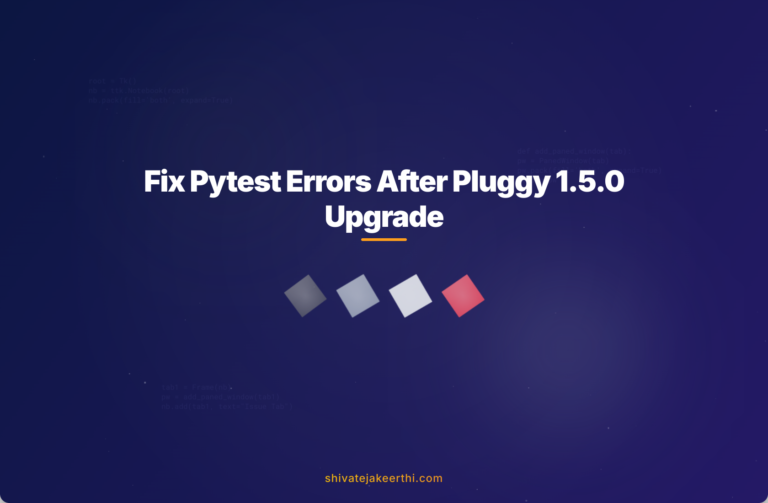When you’re writing automated tests in Python, pytest is one of the most powerful and beloved frameworks you can turn to. Behind pytest’s flexible behavior lies Pluggy, a plugin management library crucial for pytest’s functioning. However, when you update to Pluggy 1.5.0, you might encounter several tricky warnings and errors such as PluggyTeardownRaisedWarning, UnexpectedMethodCallError, and CoverageWarning. Today, let’s untangle these common pytest issues and explore ways to keep your test automation smooth and frustration-free.
Understanding PluggyTeardownRaisedWarning in pytest
PluggyTeardownRaisedWarning typically appears after pytest finishes running tests. The warning indicates that during pytest’s teardown phase—a stage when your testing environment is being cleaned up—something unexpected happened. For instance, maybe a fixture teardown method failed silently or an exception went unnoticed.
A common cause of this warning is a fixture cleanup function hitting an error that pytest didn’t handle quietly. Imagine you’re throwing a party—setting up decorations is your setup phase, and teardown is cleaning up afterward. PluggyTeardownRaisedWarning is akin to finding leftover confetti—a sign that cleanup wasn’t complete.
Other typical reasons include resource leaks, improperly handled external connections, or unclosed file handles. These issues often result from fixtures not properly declaring dependencies or explicitly closing resources.
Investigating UnexpectedMethodCallError in pytest with Pluggy 1.5.0
Another often-seen error working with Pluggy 1.5.0 is UnexpectedMethodCallError. pytest and Pluggy collaborate using a plugin mechanism—pytest calls specific methods in plugins based on your test environment’s needs. An UnexpectedMethodCallError arises when pytest calls a plugin method it didn’t expect based on the current lifecycle context.
This error generally happens after upgrading Pluggy without adjusting your plugins or test setup, causing incompatibilities. Suppose you’ve updated pytest or Pluggy without synchronizing dependencies properly. Older plugins or fixtures may not support the new plugin hooks available in Pluggy 1.5.0, causing confusion in pytest’s plugin manager.
Additionally, if you’re using homemade or community plugins that haven’t been adequately updated, pytest can misinterpret method calls. These incompatibilities frequently cause UnexpectedMethodCallErrors.
Addressing CoverageWarning issues in pytest with Pluggy 1.5.0
CoverageWarning comes up when using pytest along with Python coverage tools like Coverage.py. It depicts an area where the code you’re testing is not adequately reported by the coverage tool due to configuration problems or plugin conflicts.
Coverage tools ensure all parts of your codebase are properly tested, identifying areas you miss. CoverageWarning often pops up when pytest plugins introduce subprocesses, threading, or asynchronous calls that the coverage tool struggles to detect accurately. These coverage gaps can give you unreliable feedback about your test quality.
To troubleshoot these warnings, start by reviewing your coverage tool configuration. Ensure you’re using proper settings within your .coveragerc file, explicitly include sources, or configure the ‘parallel’ pragma when dealing with multi-threaded or subprocess scenarios.
Resolving PluggyTeardownRaisedWarning, UnexpectedMethodCallError, and CoverageWarning in pytest
Effectively solving PluggyTeardownRaisedWarning begins with clear fixture design. Best practices include:
- Explicitly closing resources after use (sockets, file handles).
- Using context managers to clean up resources automatically.
- Adding explicit error handling during teardown using Python’s try-except blocks.
- Reviewing pytest fixtures carefully after upgrading dependencies, ensuring compatibility.
For instance, you might convert a fixture from:
@pytest.fixture
def database():
db = connect_to_db()
yield db
db.close()
To a more robust, error-proof fixture:
@pytest.fixture
def database():
db = connect_to_db()
try:
yield db
finally:
db.close()
To resolve UnexpectedMethodCallError effectively:
- Double-check installed pytest plugins, updating or uninstalling outdated ones.
- Ensure your project’s plugins clearly define and use pytest’s hook specifications properly.
- Review recent changes in Pluggy or pytest’s official documentation to understand API changes.
A valuable debugging tactic could involve selectively disabling plugins or hooks temporarily to identify the problematic component.
When addressing CoverageWarning, consider the following strategies:
- Review and update your .coveragerc to include missing areas explicitly.
- Run coverage tool with the –debug=dataio flag to investigate why certain code sections might be missed.
- Use the coverage API to explicitly mark blocks that run asynchronously.
An example of a proper .coveragerc modification could be:
[run]
source =
./project_module
parallel = true
concurrency = multiprocessing
Updating to the latest version of Pluggy for pytest
Ensuring your testing library and plugins are up to date can preemptively prevent issues. Upgrading to Pluggy 1.5.0 provides numerous benefits, including bug fixes, improved compatibility, and new hooks supporting complex testing scenarios.
To update Pluggy seamlessly in your pytest environment, execute the following:
pip install --upgrade pluggy pytest
Always check your plugins post-upgrade to validate compatibility and test runs. Updating regularly ensures your project benefits from the latest fixes and enhancements available, reducing the chances of unexpected errors or warnings appearing later.
By effectively addressing PluggyTeardownRaisedWarning, UnexpectedMethodCallError, and CoverageWarning problems, your test automation with pytest becomes stable and reliable. Handling these issues head-on ensures continuous integration pipelines stay green and deliver trustworthy outcomes to your development team.
Efficient troubleshooting and proactive maintenance of testing libraries significantly contribute to quality software development. Solving these common pitfalls promotes a robust testing strategy and facilitates faster, smoother iterations for your entire development cycle.
How often have you stumbled upon these pytest warnings and errors? Feel free to share your experiences or questions in the comments below!



0 Comments